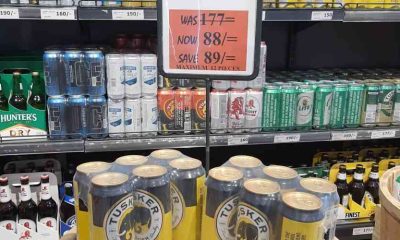Lifestyle
Kenya Raises Drinking Age to 21, Bans Alcohol Sales in Public Places and Promos By Influencers, Celebrities

NAIROBI – Kenya has implemented sweeping alcohol control measures, raising the legal drinking age from 18 to 21 and banning alcohol sales in numerous public venues as part of a comprehensive crackdown on substance abuse among youth.
The new policy, launched Wednesday by the National Authority for the Campaign Against Alcohol and Drug Abuse (NACADA), represents one of the most significant shifts in Kenya’s alcohol regulation framework in recent years.
Key changes
Age restrictions : No person under 21 will be permitted to consume alcohol or enter alcohol-selling premises, even when accompanied by an adult. Entertainment venues and retailers must strictly enforce this new threshold, ending the long-standing 18-year minimum age.
Comprehensive location bans : The policy establishes extensive restrictions on where alcohol can be sold and consumed. Events where children are present face complete alcohol sale prohibitions, covering sports competitions, music festivals, art competitions, and entertainment shows.
The geographical restrictions are equally sweeping, encompassing public beaches, parks, amusement facilities, medical centers, sports venues, and all transportation infrastructure including bus parks, railway stations, ferry terminals, and petrol stations. A 300-meter exclusion zone around all educational institutions, from primary schools to universities, creates alcohol-free buffer zones.
The policy fundamentally reshapes retail alcohol access by banning sales in supermarkets, outlets selling children’s products like toy shops, residential premises, and restaurants.
Traditional informal sales channels through vending machines, hawkers, and home deliveries are completely eliminated.
Even basic education institutions, tertiary colleges, and higher learning facilities become alcohol-free zones for both sales and consumption.
Comprehensive marketing restrictions : The advertising overhaul represents perhaps the most dramatic shift in alcohol promotion practices.
Beyond prohibiting celebrity endorsements, the policy mandates that anyone appearing in alcohol advertisements must be over 25 years old, creating a significant barrier for youth-targeted marketing.
The restrictions extend to lifestyle advertising that suggests alcohol consumption is fashionable or acceptable before, during, or after activities requiring concentration such as driving, operating machinery, or playing sports.
Television and radio face watershed restrictions, banning alcohol advertisements between 5 AM and 10 PM when young audiences are most likely to be watching.
Content creation across all media platforms faces new limitations, with the production and broadcasting of music, films, stage plays, and audio-visual programs that positively depict alcohol consumption now prohibited on electronic and print media.
Prize-oriented competitions and promotions designed to encourage increased alcohol consumption are banned entirely.
Sports sponsorship arrangements face complete restructuring, as manufacturers, importers, distributors, and retailers can no longer name sports teams after alcoholic products or sponsor sports leagues, tournaments, or national teams.
The policy also eliminates promotional practices like free sampling and discount sales that have traditionally driven retail alcohol sales.
Driving factors
Interior Cabinet Secretary Kipchumba Murkomen announced the measures at Radisson Blu hotel, citing “an alarming rise in substance potency and variety, coupled with surging illicit drug trafficking.”
The policy responds to concerning statistics revealed in NACADA’s February 2025 university study.
Among 15,678 surveyed students, 87.3% consumed alcohol, 64.4% used cigarettes, and 41.2% used shisha.
Most troubling, 66.4% sourced substances from friends while 59.3% obtained them from neighborhood bars and canteens.
Retail and licensing implications : The new framework requires fundamental changes to alcohol retail operations across Kenya.
All entertainment venues and alcohol outlets must implement strict age verification systems, with no exceptions for adult accompaniment of minors.
This represents a significant departure from previous practices where parental presence could override age restrictions.
Licensing authorities face new obligations, as outlets located within three hundred meters of educational institutions will be prohibited from obtaining or renewing alcohol sales licenses.
This creates immediate compliance challenges for existing establishments in densely populated urban areas where schools and retail outlets often coexist in close proximity.
The policy also addresses packaging and labeling requirements, mandating that all alcoholic beverages display prominent health warnings, ingredient lists, and pictorial warnings.
Size restrictions and packaging specifications aim to reduce the appeal and accessibility of alcohol products, particularly to younger consumers who may be attracted to smaller, more affordable options.
“All stakeholders must act, leveraging the provisions of this policy to forge strong, synchronized partnerships with the government,” NACADA stated, emphasizing the need for coordinated enforcement.
When it will start working
While specific enforcement dates weren’t announced, the policy takes immediate effect for new licenses and operations.
Existing establishments will need to adapt their practices to comply with the age verification and location restrictions.
The measures represent Kenya’s most aggressive approach to alcohol control, targeting both supply-side restrictions and demand-reduction through marketing limitations.
Success will depend on consistent enforcement across the country’s diverse entertainment and retail landscape.
Kenya Insights allows guest blogging, if you want to be published on Kenya’s most authoritative and accurate blog, have an expose, news TIPS, story angles, human interest stories, drop us an email on [email protected] or via Telegram
-

 Politics2 weeks ago
Politics2 weeks agoYour Excellency! How Ida’s New Job Title From Ruto’s Envoy Job Is Likely to Impact Luo Politics Post Raila
-

 Americas5 days ago
Americas5 days agoEpstein Files: Bill Clinton and George Bush Accused Of Raping A Boy In A Yacht Of ‘Ritualistic Sacrifice’
-

 Business6 days ago
Business6 days agoCooking Fuel Firm Koko Collapses After Govt Blocks Sh23bn Carbon Deal
-

 Business6 days ago
Business6 days agoABSA BANK IN CRISIS: How Internal Rot and Client Betrayals Have Exposed Kenya’s Banking Giant
-

 News2 weeks ago
News2 weeks agoKenya Stares At Health Catastrophe As US Abandons WHO, Threatens Billions In Disease Fighting Programmes
-

 Business2 weeks ago
Business2 weeks agoMinnesota Fraud, Rice Saga, Medical Equipment Deal: Why BBS Mall Owner Abdiweli Hassan is Becoming The Face of Controversial Somali Businessman in Nairobi
-

 Business3 days ago
Business3 days agoKRA Can Now Tax Unexplained Bank Deposits
-

 Investigations1 week ago
Investigations1 week agoPaul Ndung’u Sues SportPesa for Sh348 Million in UK Court, Accuses Safaricom Boss of Sh2.3 Billion Conspiracy


















